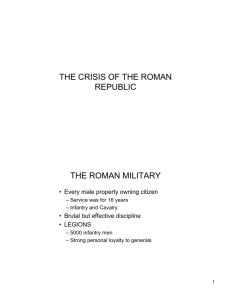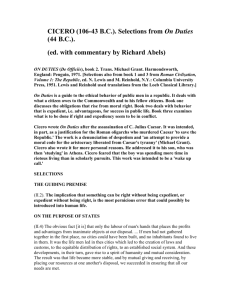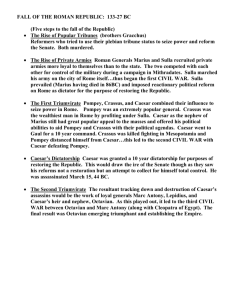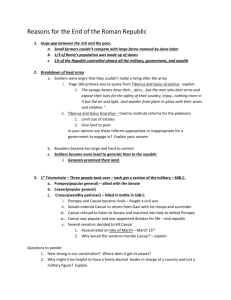Roman Senate- 63 BC Dossier
advertisement
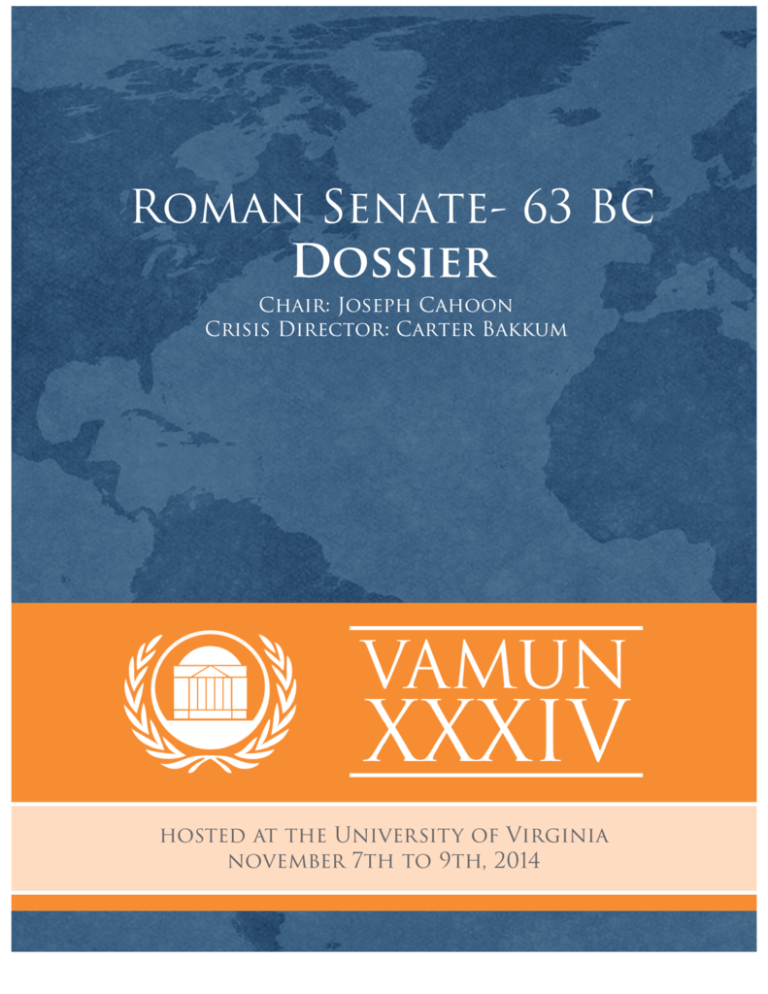
Roman Senate- 63 BC 1 Roman Senate- 63 BC Dossier Chair: Joseph Cahoon Crisis Director: Carter Bakkum Roman Senate- 63 BC 1 Preface: Here is a list of all of the positions for this committee. Keep in mind that we might not end up having the last few. The layout includes the name (and sometimes the title) of each Senator, his political party, and also how radical he is within the ideology of his party. Marcus Tulius Cicero: (Optimates, moderate) You have probably heard of Cicero. What most people know about him is that he was a famous Roman politician and orator whose speeches can still be read today. However, what made him remarkable in his day was that he achieved such fame and political power as an eques. In 63 BC, he served as consul. Gaius Antonius Hybrida: (Optimates, moderate) Brutal treatment of Greeks while serving as one of Sulla’s legates earned him the nickname “Hybrida,” implying that he was half-man, half-animal. Gaius Julius Caesar took him to court over the transgressions, and eventually he was banished from the Senate by the censors. Later on, Hybrida was elected tribune and therefore allowed to return to the Senate. In 63 BC, he served as consul. Gaius Julius Caesar: (Populares, progressive) Yes, that Julius Caesar. He rose to prominence first in the 70s, when he returned to Rome after several years in hiding from Sulla’s proscriptions. He prosecuted corrupt regional governors and gained fame as a very effective, if a bit theatrical, orator. After famously being captured by pirates, he was elected first as quaestor and then in 63 BC as Pontifex Maximus (essentially the Roman Republic’s Pope). He had a lot going for him and was very popular with the people, but at the time of our committee he was deeply in debt. Publius Clodius Pulcher: (Populares, very progressive) Despite being of exceedingly prestigious birth, Clodius was a prominent member of the Populares and largely a champion of the people. Less honorably, he was often the person to see the ends as justifying the means, using thuggish tactics to accomplish political goals. Furthermore, Clodius seduced the wife of fellow senator Lucius Licinius Lucullus. This woman happened to be Clodia, Clodius’ sister (and also the subject of Catullus’ love poems, who called her Lesbia). Marcus Porcius Cato: (Optimates, very conservative) Often referred to as Cato the Younger to distinguish him from his famous ancestor, this man strived to live life according to Stoic philosophy. He saw most of the Senate, especially the Populares, as morally bankrupt. Known never to compromise his principles or give in to bribes, Cato dressed and ate like a pauper despite being incredibly wealthy. He served as quaestor in 65 BC, and took the opportunity to bring a whole host of former quaestors to answer for embezzling public money. Publius Servilius Rullus: (Populares, very progressive) Best known for proposing the land reform mentioned in the topic guide, Rullus is often thought of as a puppet for some greater political power. However, historians disagree on whose puppet he was (Pompey? Crassus? Caesar?), so this description is not as restrictive as it could be. His own goal in introducing the legislation was probably to stir up the people he represented as one of the tribunes of the plebs in 63 BC. Roman Senate- 63 BC 2 Titus Labienus: (Populares, moderate) In 63 BC, Titus Labienus was good friends with Pompey, having served with him in the Roman military. He was also quite close to Caesar, and together they prosecuted Gaius Rabirius for killing a tribune of the plebs 37 years earlier. Labienus himself was a tribune of the plebs in 63 BC. Despite some political success, his greater achievements would be as a soldier, not a Senator. Marcus Licinius Crassus: (Populares, moderate) Crassus, a calculating power broker and rival to Pompey, was one of the wealthiest men of all time. He was able to amass such extensive resources by swallowing up the estates of men killed in Sulla’s proscriptions. He previously served as co-consul with Pompey in 70 BC, right after the two of them played such an integral role in ending the Third Servile War. His financial clout meant that he could easily maneuver his supporters into office by backing expensive political campaigns. Lucius Valerius Flaccus: (Optimates, moderate) Staunch friend and supporter of Cicero, Flaccus was one of the praetors in 63 BC. Coming from a prestigious family, he had served in the military in Cilicia early in his life and then later as a legate against Cretan pirates. The commander of the campaign against the pirates was Pompey, but rather than bring the two men together Flaccus grew to resent Pompey’s power and popularity. Flaccus was also a quaestor in 70 BC. Quintus Caecilius Metellus Celer: (Optimates, very conservative) Having served before as a legate in 66 BC, Celer was a praetor in 63 BC. When Julius Caesar and Titus Labienus prosecuted Gaius Rabirius, he declared the trial itself to be moot and let him go (Rabirius had killed a tribune of the plebs in 100 BC at the request of the Senate). While he certainly opposed Populares like Caesar and Clodius at every turn, he also disapproved of moderate (and especially low-born) Optimates like Cicero. He also married Clodia after she was divorced by Lucius Licinius Lucullus. Manius Acilius Glabrio: (Populares, moderate) Despite being one of the Populares, Glabrio had a bone to pick with many of his so-called allies in the Senate. The decision to strip him of his command in Asia Minor was largely bipartisan, replacing him with Pompey. Even though the decision was admittedly justified by Glabrio’s complete failure in the region, to him it was still a great personal disgrace for a former consul like himself. Despite this, he managed to get elected as censor, and remained in office in 63 BC. Lucius Aurelius Cotta: (Optimates, moderate) This old-guard patrician served as consul in 65 BC, and in 63 BC was a censor (for our purposes we are pretending that he didn’t abdicate). Before being consul himself he spearheaded an effort to uncover the corruption of the 66 BC consuls, and this successful campaign won him the office for the following year. He greatly respected his friend and fellow member of the Optimates Cicero, but was also rather fond of his nephew Julius Caesar. Roman Senate- 63 BC 3 Marcus Calpurnius Bibulus: (Optimates, conservative) While Julius Caesar is more often remembered as being a rival to Pompey, during his earlier days Bibulus appeared as his counterpart in the Optimates. They both served as aedile in 65 BC, and all accounts show Caesar’s popularity in the position far exceeding Bibulus’. They both have their eyes on a consulship in a few years, so Bibulus was eager to close the gap between them and distinguish himself in his own right. For the purposes of our committee he is quaestor in 63 BC, but he had probably already held this position earlier. Marcus Caelius Rufus: (Populares, progressive) A friend to both Julius Caesar and Cicero, Caelius will be one of this committee’s quaestors. He was actually far too young in 63 BC to hold office, but we are going to say he was thirty for our purposes. Either way, he is a fresh face in the Senate, not yet infected by the corruption of some of the older members. Publius Cornelius Scipio Nasica: (Optimates, conservative) As a disclaimer, while this man did exist he did not live during 63 BC nor does the description below represent him. He will be one of the aediles for this committee. Loyal to republican ideals and tradition, he was wary of the eques Cicero and the shady Hybrida in the consulship. He believed in maintaining the “normalcy” of the Republic and protecting it against usurpers, and does not make a distinction between those seeking change through reform and those seeking change through violence. Publius Servilius Vatia Isauricus: (Optimates, conservative) When Caesar ran for Pontifex Maximus, he used Crassus’ money and his own widespread popular support to defeat several old-guard senators who saw themselves as much more deserving of the position. Vatia was one of these snubbed senators. Instead of getting to be chief priest, he settled for aedile (he would not have done this in real life, but for our committee he will be aedile). He saw the Populares demagogues like Caesar, Clodius, etc. as being threats to the future of Rome as a whole. This is especially interesting, since Vatia himself was a favorite of Sulla and was appointed as one of the dictator’s consuls during his reign. Having the prestigious position of ex-consul since 79 BC made Vatia one of the most respected members of the Senate, making Caesar’s dark horse victory all the worse. Lucius Licinius Lucullus: (Optimates, conservative) Lucullus was an old-guard conservative with a long, storied career preceding 63 BC. This wealthy ex-consul was known for living in luxury, throwing lavish feasts for his guests and maintaining beautiful villas all over Italy. The great military success he achieved funded his lifestyle, but as of 63 BC he had not been awarded a “triumph,” or formal recognition of military achievement from the Senate. He hoped to persuade Cicero to push the Senate to award him one during his consulship. By 63 BC Lucullus had stopped concerning himself with the day-to-day minutiae of the Senate, but a crisis could bring him back into center stage. He also had a deep personal grudge against Clodius for seducing Lucullus’ wife (who happened to be Clodius’ sister). Titus Annius Milo: (Optimates, moderate) A fervent supporter and agent of Pompey (who was away in Asia Minor), Milo also worked closely with Cicero and Rufus. He was the furthest thing from an idealist, instead being something of an Optimates counterpart to Populares thug Clodius. Roman Senate- 63 BC 4 Marcus Favonius: (Optimates, very conservative) Favonius idolized Cato the Younger, and generally strived to imitate him in any way possible. He adopted Cato’s blunt speech, his unwavering stubbornness, his Spartan lifestyle, and of course, his strict republican philosophy. He accordingly hated men like Caesar and Clodius. Marcus Claudius Marcellus: (Optimates, moderate) Marcellus was another young rival of Caesar in the Optimates. As one of the younger senators, he was still figuring out where his allegiances laid in 63 BC. The most obvious choice for a young man like Marcellus would be Pompey, since at the time he seemed to hold the most power in Rome. Quintus Arrius: (Populares, moderate) In 70 BC Arrius gained fame as an eques who was elected as praetor and defeated Crixus in the Third Servile War. Unlike Cicero, he supported the Populares, throwing in his experience and legitimacy to counterbalance the party’s ambitious young firebrands. Quintus Hortensius Hortalus: (Optimates, conservative) Hortensius was a renowned Roman lawyer second to none, at least until Cicero came along and snatched that title for himself. Despite being defeated in court, by 63 BC Hortensius and his allies convinced Cicero to align with them, the Optimates, so by the time of our committee there was very little bad blood between them. He served as consul in 69 BC. Lucius Domitius Ahenobarbus: (Optimates, very conservative) Ahenobarbus was representative of the stereotypical Roman aristocrat. He disliked Caesar, Crassus, and Pompey, instead siding most closely with Cato the Younger and the other strict republicans. He doubted Cicero’s worthiness of such a high position as a mere eques, and tried to keep potential demagogues from consolidating too much power. Quintus Cassius Longinus: (Populares, progressive) No, not that Cassius. This was the famous anti-Caesar conspirator’s brother, and in 63 BC this new Senator had a very good relationship with Caesar, seeing his popularity as a tool for achieving Cassius’ own ambitions. Like many young Senators, he hoped some day to be a regional governor. Lucius Cornelius Cinna: (Populares, moderate) Cinna was a member of the Populares in 63 BC, but the company he found himself in troubled him. A man like Pompey could easily turn his legions on Rome itself and repeat the tyrannies of Sulla, to say nothing of what could happen if one of the younger Senators got his hands on an army. If he could, he wanted to reconcile republican values with Populares care for the plebeians. Do not mistake him for Cinna the poet. Mamercus Aemilius Lepidus Livianus: (Optimates, conservative) Livianus was one of the old-guard conservatives who had supported Sulla’s dictatorship. Livianus took an early liking to Julius Caesar, and personally convinced Sulla not to kill the young man. In 63 BC he was one of the senators to hold the prestigious title of ex-consul, Roman Senate- 63 BC 5 and may have actually been Princeps Senatus (the senator responsible for managing debate. Needless to say, I will be acting as our Princeps Senatus). Caius Scribonius Curio Burbulieus: (Optimates, moderate) Burbulieus was a Roman orator famous for gesturing wildly and also an ex-consul with a military triumph awarded in his name. Despite being a member of the Optimates and allying himself with Cicero, Burbulieus was also a friend of Clodius’ (Clodius was one of the most hated Populares among the Optimates). Decimus Junius Brutus: (Populares, moderate) Brutus (not that Brutus) was a former supporter of Sulla, but after the dictator’s death he took pride in staying away from the political machinations and corruptions of his peers. He did his best to ignore the power plays going on around him to focus on furthering a legislative agenda and seeing that the law was carried out. Gaius Cassius Longinus Varus: (Populares, progressive) As consul in 73 BC, Varus pleased the urban plebeians by having the state purchase and ship foreign grain into Rome to sell cheaply. He was a strong supporter of Pompey, and fathered that Cassius. Gnaeus Cornelius Lentulus Clodianus: (Optimates, conservative) After failing himself to lead Roman legions to victory, Lentulus was replaced by Crassus in the Third Servile War. Later on, he would become the censor to expel Hybrida from the Senate along with over sixty others, and then supported Pompey’s campaign in Asia Minor. Gaius Marcius Figulus: (Optimates, moderate) Figulus was one of the consuls for the previous year, 64 BC, and a supporter of Cicero. He was not terribly ambitious, as while most consuls aspired to overseas governorships Figulus refused, preferring to stay at home in Rome. Roman Senate- 63 BC 6 Works Cited Encyclopædia Britannica Online, s. v. "aedile," accessed June 11, 2014, http://www.britannica.com/EBchecked/topic/6946/aedile Encyclopædia Britannica Online, s. v. "censor," accessed June 11, 2014, http://www.britannica.com/EBchecked/topic/101964/censor Encyclopædia Britannica Online, s. v. "consul," accessed June 11, 2014, http://www.britannica.com/EBchecked/topic/134489/consul. Encyclopædia Britannica Online, s. v. "praetor," accessed June 11, 2014, http://www.britannica.com/EBchecked/topic/473655/praetor. Encyclopædia Britannica Online, s. v. "quaestor," accessed June 11, 2014, http://www.britannica.com/EBchecked/topic/485995/quaestor Encyclopædia Britannica Online, s. v. "Senate," accessed June 11, 2014, http://www.britannica.com/EBchecked/topic/534333/Senate Encyclopædia Britannica Online, s. v. "tribune," accessed June 11, 2014, http://www.britannica.com/EBchecked/topic/604799/tribune. Illustrated History of the Roman Empire, “Lucius Cornelius Sulla,” accessed June 11, 2014, http://www.roman-empire.net/republic/sulla.html Lendering John, Livius, “Senate,” accessed June 11, 2014, http://www.livius.org/sesg/senate/senator.html Stavis Zahra, Academia.edu, “State of Affairs before the Fall,” last edited 2006, http://www.academia.edu/897776/State_of_Affairs_before_the_Fall_Roman_Agrarian_Legi slation_in_the_Republic_of_Cicero Tribunes and Triumphs, “Spartacus Timeline,” accessed June 11 2014, http://www.tribunesandtriumphs.org/gladiators/spartacus-timeline.htm UNRV History, “Marius Reforms The Legions,” accessed June 30, 2014, http://www.unrv.com/empire/marius-reforms-legions.php
